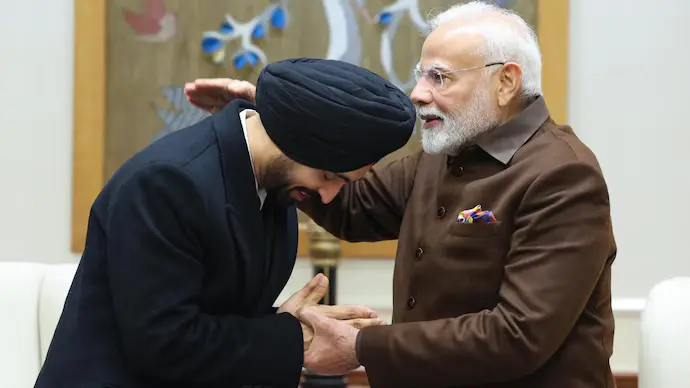
Prime Minister Narendra Modi during a meeting with singer-actor Diljit Dosanjh
News in Brief
On January 1, 2025, Punjabi singer-actor Diljit Dosanjh, known for his vocal support for farmers during their protests against the government’s agricultural reforms, met with Prime Minister Narendra Modi in New Delhi. The meeting, which focused on topics like music and culture, marked a shift in Dosanjh’s stance, as he had been a vocal critic of Modi’s policies. Dosanjh praised Modi's journey, and the Prime Minister lauded Dosanjh for blending talent and tradition. This interaction has sparked discussions about Dosanjh’s evolving political stance, with some seeing it as a reconciliation while others view it as a dilution of his earlier activism. The meeting highlights the potential for dialogue in bridging political divides.
New Delhi: In a surprising turn of events that marked the beginning of 2025, Punjabi singer-actor Diljit Dosanjh, known for his vocal support for the farmers' agitation against the central government's agricultural reforms, met with Prime Minister Narendra Modi. This interaction, which took place in New Delhi on January 1, 2025, has been widely seen as a significant shift in stance from Dosanjh, who had previously been at the forefront of advocating for farmers' rights.
Diljit Dosanjh, a household name in India for his contributions to music and cinema, had actively participated in the farmers' protests at the Singhu border in 2020, where he spoke in support of the farmers' demands and criticized the government's farm laws. His involvement was not just vocal; he donated Rs 1 crore for warm clothes for the protesters, showcasing his commitment to their cause. However, his recent meeting with PM Modi, coupled with his praiseworthy remarks, has stirred considerable discussion among his fan base and political analysts alike.
During the meeting, which both Dosanjh and PM Modi shared glimpses of on social media platforms, the conversation reportedly revolved around various topics including music and culture. PM Modi praised Dosanjh for being a "combination of talent and tradition," acknowledging his journey from a small village in Punjab to becoming an international icon. Dosanjh responded by expressing his admiration for the Prime Minister's personal journey and his connection to India's cultural and spiritual roots, particularly mentioning PM Modi's reverence for the river Ganga and his relationship with his mother.
Dosanjh's post on X (formerly Twitter) read, "A fantastic start to 2025. A very memorable meeting with PM @narendramodi Ji. We talked about a lot of things including music of course!" This statement was met with an equally enthusiastic response from PM Modi, who described their interaction as "a great interaction with Diljit Dosanjh! He’s truly multifaceted, blending talent and tradition. We connected over music, culture and more."
The meeting is notable not just for the pleasantries exchanged but for the broader implications it might have on Dosanjh's image and political engagement. Previously seen as a critic of Modi's policies, particularly regarding the farmers' protests, this interaction could be interpreted as a reconciliation or at least a public gesture of respect towards the Prime Minister. It might reflect a nuanced approach by Dosanjh to engage with political leaders beyond the lines drawn by previous conflicts, perhaps aiming for dialogue and understanding rather than confrontation.
This event has been perceived by some as a strategic move by Dosanjh to maintain his wide appeal, balancing his deep roots in Punjab and his advocacy for farmers with an acknowledgment of the national leadership. Critics, however, might view this as a dilution of his earlier stance, questioning if it signifies a shift in his political or social activism.
The meeting has sparked a variety of reactions on social media, with fans expressing pride in Dosanjh's achievements and some questioning the motives behind such a publicized interaction with the Prime Minister. Given Dosanjh's history of being vocal about social issues, this meeting might also encourage discussions about the role of public figures in political discourse and the potential for dialogue in resolving conflicts.
Advertise with US
Advertise with US
